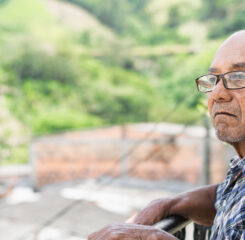Hearing: An Economy That Cares: The Importance of Home-Based Services
On March 23, 2022, the Senate Special Committee on Aging held a hearing to address, “An Economy That Cares: The Importance of Home-Based Services.” The Aging Committee hearing is part of the renewed momentum for Congress to pass an economic package in late-April that helps families and workers manage high costs, and helps people cope with increased prices.
Committee Chair Bob Casey (D-PA) opened the hearing stressing that caregiving in the United States has been framed as a personal problem limited to each individual family with many families silently struggling to find and afford high quality care for their loved ones. The hearing was an opportunity for Senator Casey to elevate the Better Care Better Jobs Act (S. 2210), which he introduced last year, to provide an immediate investment in home and community-based services (HCBS), better jobs for home care workers and better support for family caregivers.
Chairman Casey also stressed how home-based care is an investment in families and our Nation. It will help people get back to work. This kind of investment will also give home care workers, the majority of whom are women from communities of color, a much-needed and long overdue raise. Senator Casey’s full remarks are available here.
Ranking Member Tim Scott (R-SC) echoed his colleagues opening remarks, noting that he supports other solutions such as a proposal that he put forward in July 2021 which implements ‘self-directed care’ and allows caregivers and recipients to be empowered to make informed decisions about the services they want and need. Senator Scott also shared his personal connection to an investment in caregivers, highlighting that his mother has worked as a nurse’s assistant for 49 years.
Witnesses at the hearing shared their professional and personal experiences with accessing home and community-based services. These witnesses outlined the challenges faced by Medicaid’s complex system of waivers and state plan amendments that creates an administrative burden for states, makes it challenging for individual beneficiaries to navigate options, and creates inconsistent benefits both within and between states. The hallmark of Medicaid home and community-based services is its patchwork and undeveloped nature where widespread inconsistencies mean getting quality care relies on individuals being in the right neighborhood, in the right state, with the right set of needs. HCBS recipients shared their personal stories on how lack of access to home care created burdens on their families and left them feeling dehumanized. One witness’ direct care worker also shared from her eleven years in the field that the current long term care system is crumbling after COVID-19.
Senators consistently emphasized the impact of the lack of home-based care on families. Not only were a number of Senators family caregivers themselves, but many acknowledged the economic costs to individuals who choose to leave the workforce to care for loved ones. Additionally, multiple Senators remarked on the growing waitlists for home and community-based services, questioning whether these waitlists accounted for all the home-based care needs or only a small proportion.
In his closing statement Senator Casey acknowledged the important role nursing homes serve in the health care system and emphasized that individuals should have the choice of where they receive care.

Most Recommended
October 15, 2025
 Shutdown Week Three: Impact of Ongoing Closure on Affordable Housing
Shutdown Week Three: Impact of Ongoing Closure on Affordable Housing
February 24, 2026
Fiscal Year (FY) Funding 2026
October 07, 2025
Immigrant Workforce Matching Program Brings Workforce Relief
Recently Added
March 03, 2026
DOL Proposes New Worker Classification Rule
March 03, 2026



